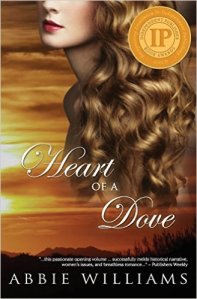 Lorissa Blake is a young lady old beyond her years. Sold into prostitution at the age of fifteen after losing her entire family to war and sickness, she bears witness to desperation and despair each night she is forced to sell her body. Learning to play the part of Ginny Hossiter’s star whore, Lila, may have saved Lorissa from starvation on the streets, but it has come at a high price, and she has lost all hope of ever being free and happy again.
Lorissa Blake is a young lady old beyond her years. Sold into prostitution at the age of fifteen after losing her entire family to war and sickness, she bears witness to desperation and despair each night she is forced to sell her body. Learning to play the part of Ginny Hossiter’s star whore, Lila, may have saved Lorissa from starvation on the streets, but it has come at a high price, and she has lost all hope of ever being free and happy again.
The monotony of her existence is unexpectedly broken one night when a band of former Confederate soldiers from Tennessee pays a visit to the saloon. Angus Warfield, the patriarch of the group, is horrified to discover a personal connection to Lorissa and immediately facilitates her escape, despite threats of vengeance from Ginny. Lorissa finds herself journeying north with Angus and his companions, Boyd, Sawyer, and Malcolm – each having also experienced unbearable loss at the hands of the War- as they head to Minnesota to take advantage of the Homestead Act. Life on the trail exceeds all expectations for Lorissa, as she quickly forms deep bonds with her new makeshift family and allows herself to feel joy once again; but this peace is not to last, as they soon discover they are being pursued by a deranged madman hell-bent on revenge.
There is so much to love about this book, I don’t know where to begin. I was sucked in from the very first page and ended up reading it multiple times. The characterizations are so convincing; I could immediately relate to the characters because their mannerisms, speech, and behaviors were so similar to people I have known in real life. Being a native Tennessean myself, I can say that Williams nailed the depictions of Angus, Boyd, Sawyer, and especially Malcolm, who brought back memories of two of my own cousins when they were young men.
Likewise, I have never been to the Midwest, and yet the vivid descriptions of the sprawling, unchanging prairies and the wide open skies made me feel like I was there. I could practically feel the slow bumping of the wooden wagon beneath me, and I could hear the grass moving and sliding beneath the wheels and the gentle noises of the horses as the team slowly trundled their way across the landscape. The deep love of horses conveyed through Lorissa and Sawyer inspired a similar interest in me, and spurred me to invite myself over to an acquaintance’s farm so I could spend a little time with her horses and nuzzle a few soft noses myself.
One of my favorite scenes was when Lorissa’s group encounters another family traveling north, and excited for the company, they have an impromptu dinner party that evening. The imagery was beautiful: an old farm table sitting in the middle of the vast prairie, set with tin plates and cups of lemonade, a baby in a basket on the ground being rocked by her mother’s foot, faces softly lit by the glowing lanterns, all set against the backdrop of a brilliant sunset. Later that evening, Boyd plays his fiddle around the campfire and thousands of lightning bugs blink against the night sky. It was a gorgeous scene and I longed to be there myself.
The heart of the story, of course, is the blooming love between Lorissa and one of her companions. I won’t go into detail about who she falls in love with, so as not to give too much away, but their passion for each other is gripping, and I was on the edge of my seat while they were stealing kisses behind the wagon and sneaking away from camp after dark. This story stands out from other romances in the sense that there is considerable depth to the characters, and the build-up to the love affair is slow and sweet. I found that deliberate build-up to be very refreshing, and it leant a further sense of honesty to the relationship because it allowed time for both the reader and the characters to actually build connections, which doesn’t happen when they instantly jump into bed together.
There are a few typos (perhaps I have an early copy?) and an occasional awkwardness in the dialogue between Lorissa and her beau, but the compelling nature of the narrative prevents them from being a distraction. This book has a lot to offer fans of historical fiction who also enjoy a strong love story. The romance will suck you in and leave you giddy for days (the hallmark of any good love story, in my opinion). This is the first in a trilogy, and I look forward to reading the next book, Soul of a Crow, coming out later this year.
P.S. This book won the 2015 Gold Medal for Romance at the Independent Publishers Book Awards. Congratulations, Abbie!!
 I have a new favorite book. And as is typical of my favorites, it must come with a disclaimer for those of you who don’t like to be pushed out of your comfort zone: it is heartbreaking, beautiful, and tragic.
I have a new favorite book. And as is typical of my favorites, it must come with a disclaimer for those of you who don’t like to be pushed out of your comfort zone: it is heartbreaking, beautiful, and tragic.

